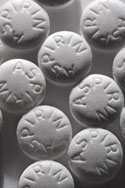Aspirin can help keeps hearts healthy
 |
| Aspirin can help prevent heart attacks. |
If you want to prevent heart attacks, one of the simplest things you can do is to take aspirin.
Some of the most convincing evidence for aspirin's benefit in preventing heart attacks comes from the Physician's Health Study 1982-1995, which demonstrated a 44 percent reduction in heart attack frequency in patients who took aspirin regularly.
The American Heart Association recommends the equivalent of a baby aspirin daily for prevention of a heart attack. This works to limit the number of extra platelets attracted to plaque in the blood stream, stopping the formation of dangerous clots.
Even blood vessels that are relatively free flowing may contain dangerous plaque. If plaque breaks off and floats in the arteries, it sets up a domino effect. Once in the blood flow, plaque hails platelets like a pedestrian hailing a taxi on a street curb. Soon the scene resembles Broadway as a crowd exits a play. The platelets arrive and summon more platelets. Soon you have a clump of platelets and the tiny fibers that bind them together. A big enough clump can block a blood vessel or float down-stream and lodge where the vessel branches off and narrows. This blockage can cause a heart attack.
Aspirin provides an anti-clotting effect for four to seven days. Other non steroidal anti-inflammatory drugs, or NSAIDs such as Ibuprofen and Naproxen, only temporarily have an anti-clotting effect. For some NSAIDs, this effect is as short as a few hours and can interfere with a natural clot-busting factor. Aspirin's anti-clotting effect, however, far outweighs its inhibition of the natural clot-busting mechanism.
The U.S. Food and Drug Administration has specific recommendations for those wishing to take aspirin while on another NSAID.
The bottom line is that aspirin can be quite effective in warding off heart attacks. As with all medications, it comes down to risk versus benefit. Please check with your doctor about taking aspirin for the prevention of a heart attack.
-- Brian Svazas, MD
Safety Tip of the Week Archive
|